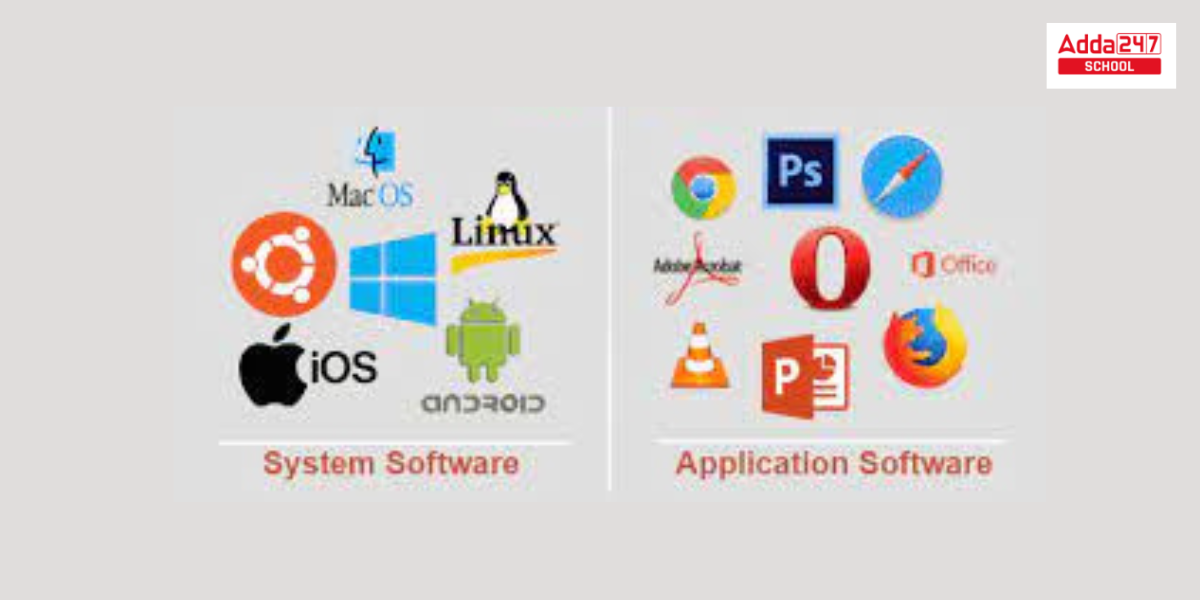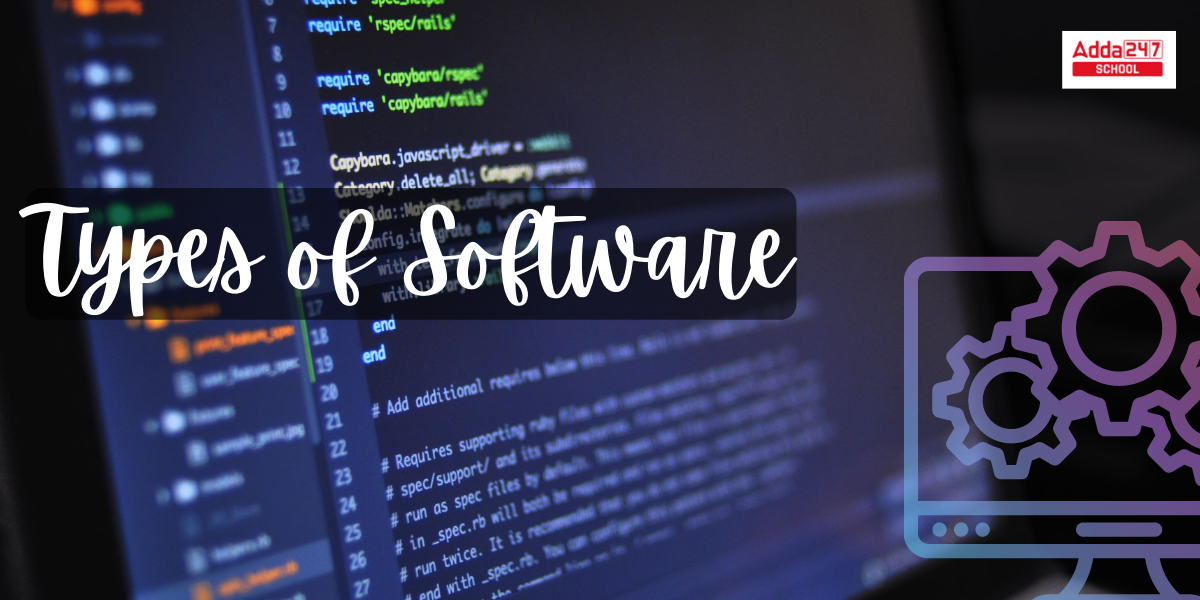Types of Software: In our daily lives, we encounter several computer software programmes that assist us in doing our chores quickly and efficiently. A set of instructions, data, or programmes used to control computers and carry out specified activities is referred to as software. It is the inverse of hardware, which describes a computer’s physical components. Software is often abbreviated as SW or S/W and it is described as a collection of data, programmes, processes, instructions, and documentation that performs certain preset tasks on a computer system. It allows users to engage with computers. There are two types of software: system software and application software. In this post, we will look at both forms of software, and some other software and the differences between them.
Types of Software: What is Software?
Software is an umbrella phrase for apps, scripts, and programmes that execute on a device. It is the variable part of a computer, whereas hardware is the invariable part. Computer hardware and software are inextricably linked, and neither can function separately. The combination of hardware and software provides control and flexibility to modern computing systems.
Early software was built for individual computers and sold alongside the hardware on which it operated. Software began to be marketed on floppy discs in the 1980s, and then on CDs and DVDs. Most software is now purchased and downloaded simply from the internet. The software can be obtained through vendor or application service provider websites.

Types of Software in Computer
Application software and system software are the two main types of software.
- Application software is software that fulfils a specific purpose or performs a task.
- System software is designed to run the hardware of a computer and provides a framework for programmes to run on top of it.
There are some other types of software too. Programming software, which offers the programming tools required by software developers; another software called middleware, which sits between system software and application software; and driver software, which manages computer devices and peripherals, are examples of other forms of software.
What is System Software?
When the user initially turns on the computer, the system software is initialised and loaded into the system’s memory. It operates in the background and is not visible to end users. As a result, this form of software is frequently referred to as ‘low-level software’. The actions and functions of the hardware and software are coordinated by system software. Furthermore, it manages the activities of computer hardware and offers a framework or platform for all other forms of software to operate in. This is why it is essential in managing the complete computer system. Simply, system software serves as a bridge or intermediary between the user and the hardware.

Types of System Software with Examples
The operating system is the most excellent example of system software; it manages all other computer programmes. Other types of system software include firmware, computer language translators, and system utilities. Some of the system software with examples are discussed below.
Operating System
It is the most fundamental example of system software found in all computing devices. It is a collection of software that manages resources and provides generic services to the various apps that run on a given system. Examples of operating systems include:
- Android
- CentOS
- iOS
- Linux
- Mac OS
- MS Windows
- Ubuntu
- Unix
Firmware
Firmware is permanent software that is embedded in read-only memory. It is a set of instructions that is permanently stored on a hardware device. Firmware is classified as’semi-permanent’ since it remains permanent unless updated with a firmware updater. Here are some samples of firmware:
- BIOS
- Computer Peripherals
- Consumer Applications
- Embedded Systems
- UEFI

Device Drivers
It is a sort of software that manages specific hardware connected to the system. Displays, sound cards, printers, mice, and hard discs are examples of hardware devices that require a driver to connect to a system. Device drivers include the following:
- BIOS Driver
- Display Drivers
- Motherboard Drivers
- Printer Drivers
- ROM Drivers
- Sound card Driver
- USB Drivers, etc
Language Processor
This type of system software translates human-readable text into machine language. Also known as machine code.
Java, C, C++, Python, and other programming languages are examples.
Utility / System Utility
Utility software is intended to aid in the analysis, optimisation, configuration, and maintenance of a computer system. It provides assistance to the computer infrastructure. Utility tools include the following:
- Avast Antivirus
- Directory Opus
- McAfee Antivirus
- Piriform CCleaner
- Razer Cortex
- Windows File Explorer
- WinRAR
- WinZip
Application Software
Application software, the most prevalent kind of software, is a set of computer programmes that carry out a particular task for a user or, occasionally, for another application. An application can be a standalone or a collection of programmes that operate the application for the user. Apps, or application software, are also known as non-essential software because their demand is highly subjective and their absence has no effect on the system’s operation. Apps on our smartphones are also examples of Application Software.

Types of Application Software with Examples
Examples of application Software: Office suites, graphical software, databases and database management programmes, web browsers, word processors, software development tools, image editors, and communication platforms are examples of modern apps.
Word Processors
These applications allow you to create documents in which you can write and change whatever you want. It also aids in the storage, formatting, and printing of papers. Word processors include the following:
- Abiword
- Apple iWork- Pages
- Corel WordPerfect
- Google Docs
- MS Word
Multimedia Software
It is the software that can play, generate, and record picture, audio, and video data. They are used in video editing, animation, graphics, and image editing, among other things. Multimedia software examples include:
- Adobe Photoshop
- Inkscape
- Media Monkey
- Picasa
- VLC Media Player
Database Software
A database management system is a piece of software that allows you to construct and manage databases. They assist with data organisation. DBMS examples include:
- Clipper
- dBase
- FileMaker
- FoxPro
- MS Access
- MySQL
Graphics Software
Graphics Software, as the name implies, was created to deal with graphics by allowing the user to modify or update visual data or images. It is made up of image editors and illustrators.
- Adobe Photoshop
- CorelDRAW
- Autodesk Maya
- Blender
- Carrara
- PaintShop Pro
- GIMP
- Modo
Types of Software Maintenence
Once the software is out, developers must constantly adjust it to satisfy changing customer demands and address issues raised by users. This involves enhancing functionality, resolving errors, and modifying software code to avoid problems. When it comes to maintenance, there are four types of updates that developers can make.
Corrective
Users frequently identify and report bugs that developers must address, such as code flaws and other issues that prevent the software from satisfying its requirements.
Adaptive
Developers must make modifications to their programme on a frequent basis to ensure compatibility with changing hardware and software environments, such as when a new version of the operating system is released.
Perfective
These are modifications that improve the operation of the system, such as improving the user interface or optimising software code.
Preventive
These adjustments are made to prevent software failure and involve tasks such as code restructuring and optimisation.
| Related posts | |
| Types of Angles | Types of Triangles |
| Types of Motion | Types of Bank |
| Types of Teeth | Types of Fever |









 AILET Result 2026 Release Date, How to D...
AILET Result 2026 Release Date, How to D...
 CLAT Result 2026 Out, Download Scorecard...
CLAT Result 2026 Out, Download Scorecard...
 CLAT Topper List 2026 Released with Rank...
CLAT Topper List 2026 Released with Rank...






